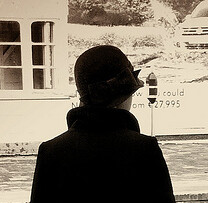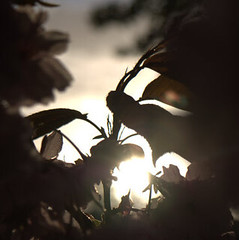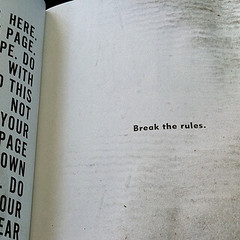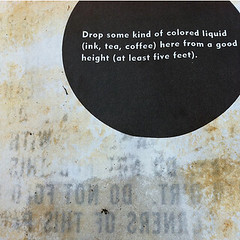1 Art
I have a certain little soft spot for a person who can unashamedly snag a heretofore unrecognized gem from the recycling bin and turn it into delightful (and powerful) works of art. So I got a little excited when we ran across artist Lisa Kokin’s “Morning Resolutions” featured on Diode Poetry Journal’s Tumblr. I tracked down Kokin’s website for background on the piece, and emerged an hour later from this virtual treasure trove of intricate pieces crafted from old books, buttons, wire, clay and thread. Now, we featured a piece in the Top Ten not so long ago on the existential and ethical debate over repurposing books, but let me tell you, we’re not talking about tearing up first edition Pulitzer winners to decorate a plastic storage bin for your hair ties. One look at Kokin’s work, and you’ll be calling her to see if she needs those books boxed-up in your attic.
If you look closely at Kokin’s pieces, you’ll see the occasional portion of a book cover. I figure in a few years (or maybe just next week, if you follow this, um, helpful guide from Huffington Post on how to cut the apron strings on your book collection) you may be discarding your books and some artist might grab them up. So if you own any of the books featured in the Best Book Covers of 2012, you might tear them off now and save them yourself, before someone else does. (Take a peek–there are some brilliant designs. My favorites, on account of my age, are the covers to Watergate: A Novel with a three-dimensional microphone and the 60th anniversary edition of 1984, with the title and author redacted.)
2 News
Maybe, you say, we don’t want to talk about the Super Bowl anymore. But it’s still up for discussion at my house. And besides. I think we have a duty of sorts to point out to any in the poetry community who might still be unaware, particularly in light of the birthday last week of Edgar Allan Poe’s “The Raven, ” that the Baltimore Ravens are named for Poe, who lived and was buried in Baltimore. Twice. So, whether you think you know a lot about football or about poetry, usher yourself to a stadium seat, Roderick, and take this little quiz at Mental Floss. See if you can identify these fellas as one of Poe’s characters or one of the Ravens. And don’t go overthinking the questions and ponder until you’re weak and weary; just listen to your heart. It will tell…
To those who foamed–and raved–and swore! for the Poe puns to stop, quoth the BookRiot, “Nevermore.” They culled an entertaining collection of game-night tweets, letting the pendulum swing from the kind that could beguile your sad fancy into smiling to those that would provoke a grave and stern decorum.
Lest you think it was merely Poe and the Ravens and nothing more, there are those who believe poetry and football go together like Emily Dickinson and anyone who ever asked her to step outside. So says Barbara Mossberg who proposed a Super Bowl Poetry Roster including Dickinson herself as wide receiver, Walt Whitman and Gertrude Stein as linemen (if I were Gertrude, and I’m not, I might be asking the guy in the striped shirt to throw down a yellow flag at that one), Tennyson as quarterback, and an offensive line including Wallace Stevens. I’m not making this up. There’s actually some pretty poetic strategy behind her lineup.
3 Places
What’s your writing space like? This piece by Vanessa Blakeslee at The Common describes the places where she writes in intimate detail–sights, sounds, textures, colors. Take a look (or a listen):
In winter, the tree outside my back window bears wild lemons. While cooking dinner, I wander out to grab one—or several, if I’m in the mood for fresh lemonade. I’ll leave my notebook behind on the red couch, and dine alone, and if, afterwards, my words still stir inside its pages, I’ll return to it, happy, once the meal is through. When I peer through the shutter slats, the moon shines on the lemons. They circle the treetop like a crown.
4 Poetry at Work
Maybe you do your writing in outer space. Or maybe just your reading. We stumbled across this fun video clip of Cady Coleman and Ron Garan reading a poem by Kushal Kadakia while the International Space Station was orbiting the earth. Okay, so maybe you’ve read poetry while the space station was orbiting the earth too. But I should mention that Coleman and Garan were actually aboard the space station that was orbiting the earth while they read the poem. I should also perhaps mention something about when is a good time to wear a hat.
It’s fitting that these astronauts would read poetry in space when one considers, as Rob Goodman argues, that “technology comes into the world wrapped in metaphor.” In an article at The Millions, Goodman suggests that human flight itself is owed to a good metaphor (it all started with a shirt billowing in the breeze, which is not to say that we owe any great technological advances to doing laundry). He goes on to make the case that technology yearns for better metaphors:
Why, to take another example, were we so attached to manned spaceflight that we spent decades and billions on space shuttle busywork? One reason: from Captain Kirk to the word astronaut (literally “star sailor”), we’ve been taught to view space exploration through the metaphor of seafaring adventure. Yet the Curiosity rover crew, without resembling swashbuckling sailors in the least, has brought back more knowledge of our solar system than any astronaut to date.
This is a terrific article on the very core of poetry at work, and worth a few minutes of your time, unless you’re still hanging shirts on the line.
5 Creativity
My sixth grade teacher required memorization of poems. I only remember standing at the blackboard reciting Kilmer’s “Trees” while Mr. Palm’s parrot, having heard the poem repeatedly over the years, occasionally chimed in with a poorly-timed squawk. Those who understand these things well will tell us there is much to be gained from learning poetry by heart, despite knowing that we could grab a book off the shelf or with a few keystrokes pull the verse up on the Internet. In a thoughtful article at The New Yorker, Brad Leithauser makes a compelling case for committing poetry to heart:
The best argument for verse memorization may be that it provides us with knowledge of a qualitatively and physiologically different variety: you take the poem inside you, into your brain chemistry if not your blood, and you know it at a deeper, bodily level than if you simply read it off a screen. Robson puts the point succinctly: “If we do not learn by heart, the heart does not feel the rhythms of poetry as echoes or variations of its own insistent beat.”
6 Write-It
If your eyes have come back from their involuntary roll over all the blatant Raven puns and Poe word play, I think this would be a good time to fulfill my moral obligation to point out that such forms of word play, while admittedly a source of chafing for some, is (or once upon a time in another culture far, far away, was considered to be) a sign of an advanced intellect. Really. I read it on the Internet. At the BBC. Here, proof.
Puncraft did not always suffer from such bad PR. The Roman orators Cicero and Quintilian believed that “paronomasia”, the Greek term for punning, was a sign of intellectual suppleness and rhetorical skill.
Intellectual suppleness and rhetorical skill. Take that, eye-roller.
7 Poems
Salmon Rushdie is quoted as saying that a poet’s work is to “name the unnameable, to point at frauds, to take sides, start arguments, shape the world, and stop it going to sleep.” It struck me as I read a selection from Michael A. Wells this week in Every Day Poems that he had done just that. I found it difficult to read, yet I found myself reading it over and again.
Foxtrot
The miles between us are narrow ruled
I can’t count the times we’ve tripped
over those same one syllable words
you the progressive one
me the traditionalist
trying to attain proximity
without overindulgence
without red flags
without precociousness
we dance around well enough
without the steps we most admire
too close for comfort
too distant to satisfy
Read the original piece, “Foxtrot, ” at Every Day Poems. And consider subscribing to receive hand-selected poems each weekday morning.
8 People
In a recent interview, Missouri poet Glenn North quoted a line from Amiri Baraka, who said, “We want poems that kill.” (Go back to that Rushdie quote about a poet’s work.) Baraka was responding to “the violence that he was seeing perpetrated against black people. His point was, what good are poems if they can’t change things and combat the violence? That led to a wave of poetry about struggle and revolution that yielded enormous influence on the people that were reading them at that time.”
If you’re in the Kansas City area, you might see about getting over to the American Jazz Museum where North is hosting “Jazz, Poetry and the Civil Rights Movement” tonight.
9 Books
Remember those great works of art from old books I pointed you to in the beginning? Well, there are really plenty of ways that you can, um, repurpose a book. Lisa Kokin has her way; Tim Holt has his. He’s been documenting the way a book, left to the elements, returns to nature. You can check the progress of this windblown volume at Book Patrol.
10 Sound n Motion
Holt’s book, several months from now, will have new stories to tell besides the ones in its pages. Stories of wind and snow and rain, of the kid that kicked it across the sidewalk and the Samoyed Husky that sniffed at it. It’s rather like the way a tree can tell you stories of its life, once you get inside it. This short documentary about wood sculptor Josh Vogel gives that inside look at the stories a tree hides, that cannot be seen from outside the bark.
Cover photo by Nick Saltmarsh. Creative Commons license via Flickr. Article photos by Claire Burge. Used with permission.
_______________
Buy a year of Every Day Poems, just $5.99 — Read a poem a day, become a better poet. In February we’re exploring the theme Plum, Purple, Indigo.
- Earth Song Poem Featured on The Slowdown!—Birds in Home Depot - February 7, 2023
- The Rapping in the Attic—Happy Holidays Fun Video! - December 21, 2022
- Video: Earth Song: A Nature Poems Experience—Enchanting! - December 6, 2022











L. L. Barkat says
“we’re not talking about tearing up first edition Pulitzer winners to decorate a plastic storage bin for your hair ties”
ha 🙂
Tickled this morning. All the way through.
Except when I got to the tree. That quieted me. And I felt like I was the hand smoothing along that forgotten trunk in the woods. Beautiful video. Like poetry, speaks more through its images than through the top-level language.
Maureen Doallas says
So enjoyed the wonderful documentary. Vogel speaks eloquently but it’s through his hands he betrays the poetic meaning of his wood-turning.
Thanks also for the intro to Kokin’s work. So creative!
Will Willingham says
The beginning (Kokin) of this article and the end (Vogel) really had me this time. I could have spent all day with either one of them.
Megan Willome says
Since RG3 wasn’t playing, I decided to support the Ravens in the Super Bowl for the sole reason that there’s a connection to Poe. I was teased mercilessly by my kids (49ers fans), until my black birds won.